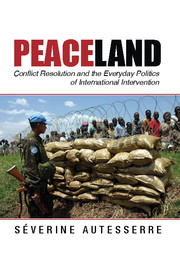Book contents
- Frontmatter
- Contents
- Figure and Tables
- Acknowledgments
- Introduction
- 1 Studying the Everyday
- Part I Constructing Knowledge of the Host Country
- Part II Constructing and Maintaining Boundaries
- 5 The Interveners’ Circle
- 6 A Structure of Inequality
- 7 Daily Work Routines
- Conclusion Transforming Peaceland
- Appendix An Ethnographic Approach
- Bibliography
- Index
- References
Appendix - An Ethnographic Approach
Published online by Cambridge University Press: 05 July 2014
- Frontmatter
- Contents
- Figure and Tables
- Acknowledgments
- Introduction
- 1 Studying the Everyday
- Part I Constructing Knowledge of the Host Country
- Part II Constructing and Maintaining Boundaries
- 5 The Interveners’ Circle
- 6 A Structure of Inequality
- 7 Daily Work Routines
- Conclusion Transforming Peaceland
- Appendix An Ethnographic Approach
- Bibliography
- Index
- References
Summary
As I mentioned in the Introduction to this book, scholars of international interventions have yet to investigate thoroughly the influence of everyday practices and habits on peacebuilding effectiveness. This gap in current research, which my book aims to narrow, is due in part to the extreme difficulty in documenting factors predicated on background knowledge. Such knowledge is not easily conveyed through words because it is practical rather than representational – meaning that it is implicit and automatic rather than explicit or deliberate – and because its contents are, in essence, “unsaid and unthought.” Moreover, practices and habits themselves are often taken for granted to such an extent that asking their enactors to identify them is usually about as productive as “asking fish, if they could speak, to describe the water in which they swim.” As a result, researchers interested in this subject cannot rely solely on the most common political science methodologies like surveys, interviews, or document analyses. To understand the influence of such everyday elements, researchers must experience those elements personally and learn them through practice. Both these objectives can be achieved only through participant and field observations.
Admittedly, such an approach, which is typical of ethnographic research, presents several complications for scholars of international relations. To begin with, its emphasis on direct contact requires researchers to gain privileged access to organizations that have a culture of secrecy, such as diplomatic missions or United Nations (UN) peacekeeping operations. Furthermore, researchers must reconcile international topics, which are usually macro-level subjects, with empirical methodologies that work best in “very localized fields of study.” Finally, the findings of such research are often so controversial that the “subjects” of a given study may attempt to prevent the publication of results because they feel that ethnographies “objectify” or expose them. As I have experienced in the past, and as David Mosse similarly relates, publically scrutinizing informal or behind-the-scenes relationships and behaviors risks not only infuriating colleagues and supervisors, but also closing doors to future research and consulting opportunities.
Information
- Type
- Chapter
- Information
- PeacelandConflict Resolution and the Everyday Politics of International Intervention, pp. 275 - 288Publisher: Cambridge University PressPrint publication year: 2014
